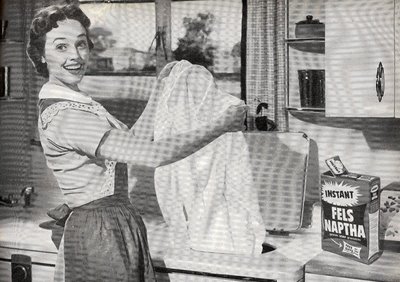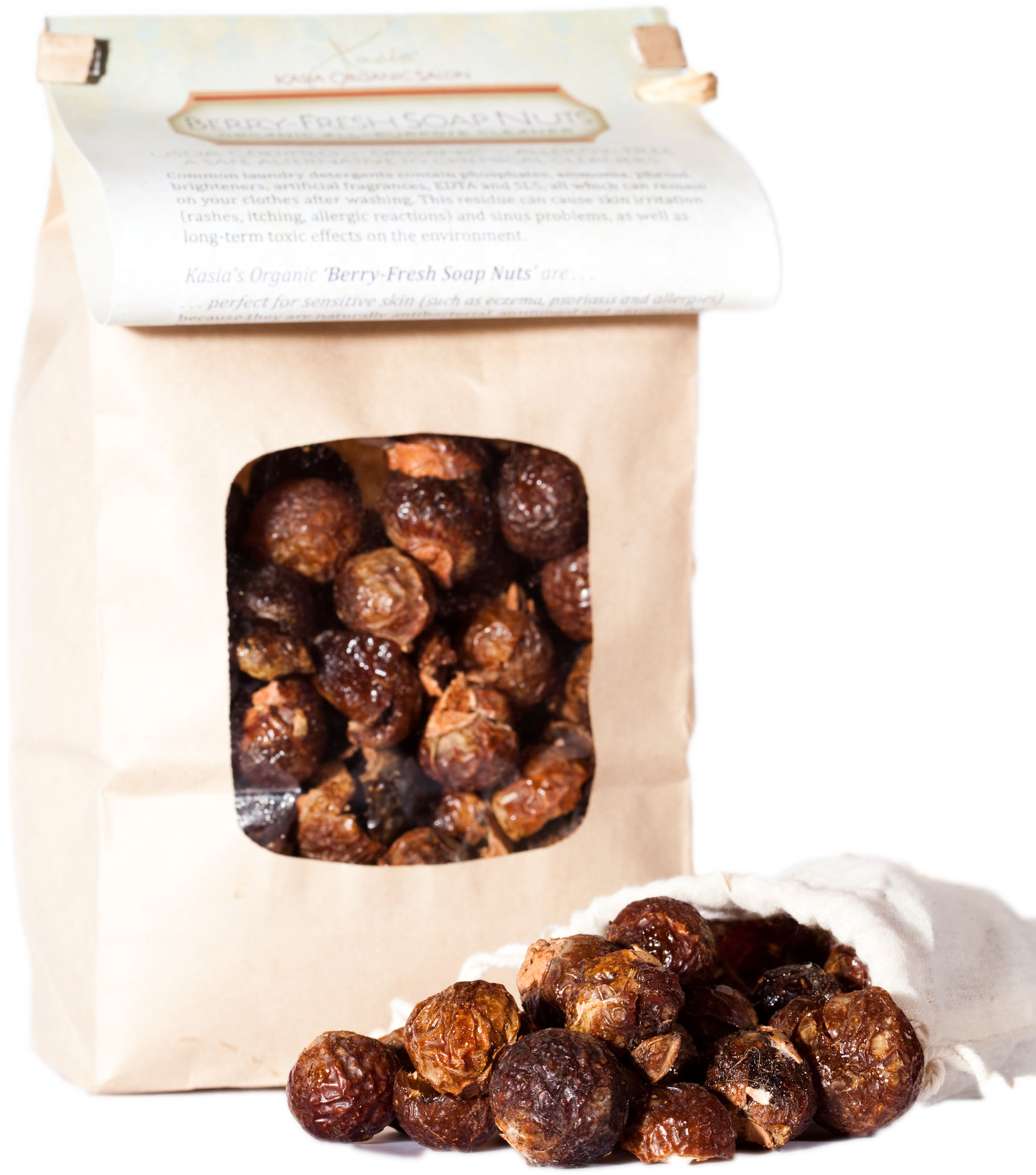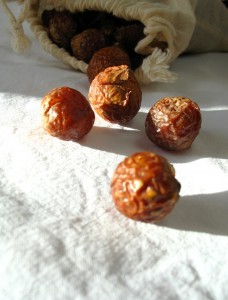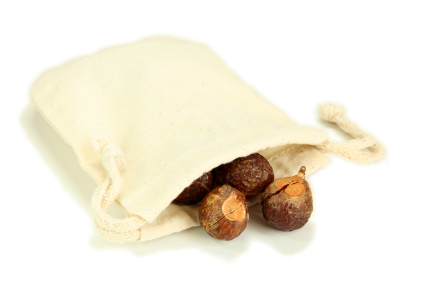Saponin Is The Key
The fruit of the soapberry tree produces saponin, which naturally protects the fruit by repelling bugs, bacteria and fungus. Approximately 15% of the outer fruit of the soapberry is made up of saponin. The seed, which is removed during harvesting, does not contain any saponin.

Frequently Asked Questions
1. Can you use soapberries (aka soapnuts) if you have a nut allergy?
The mislabeling of soapberries as soapnuts causes a lot of confusion on this topic. However, these are truly berries and not nuts and they won’t cause any kind of nut allergy.
2. How do they work?
Soapberries contain saponin, which makes water “wetter” and holds dirt suspended in water until they are rinsed away.
3. Will they remove stains?
They are effective at removing everyday stains but you may need to use a separate stain treatment for more stubborn ones.
4. Can they be used for anything other than laundry?
Yes! They can be used for cleaning a broad range of things (see below)
5. Will my whites stay white?
For best results separate your colors and whites. You can ad borax to the white wash for extra whitening.
6. Are they safe to use in all machines (high efficiency, front and top loaders)?
Absolutely - just remember to keep them in the wash bag provided (or alternatively an old sock tied at the top) to prevent the berries from getting stuck in the machine’s filter. They are great for front loading machines because they naturally produce very little foam.
7. Is it ok to leave them in the rinse cycle?
Yes. There is no residue to wash away. The saponin in the soapberry is released in warm water. Cold water is used in the rinse cycle. The saponin remaining in the rinse cycle adds body and softness to your laundry.
8. Will soapberries maintain my colors?
Yes! Soapberries will not deteriorate colors as do commercial detergents.
9. Can I use soapberries with cold water?
Yes! The saponins in the soapberry release more slowly in cold than warm water, but they still work effectively. It’s best to soak the soapberries in warm water to release the saponins.
10. Do I need to use fabric softener?
Saponins contained in soapberries leave your laundry beautifully soft, so there is no need for a commercial fabric softener.
11. Are soapberries safe to use on my really delicate clothes?
Yes! Soapberries have been used for centuries for the most delicate of silk and wool fabrics and can be safely used without bleaching out color.
12. Can soapberries be used to handwash clothes?
Yes. You can either make up a soapberry solution or else you can soak the soapberries for a few minutes in their bag in warm water.
13. I can’t see any bubbles in my wash - how can they be working?
Foam is not related to the effectiveness of the cleaning product. Although some soaps naturally foam, commercial detergents are generally low foaming with a foaming agent added to increase the perception of cleaning power.
14. Do soapberries have a lifespan? Will they lose effectiveness over time?
Provided soapberries are kept in a dry place, they should remain as effective as the day you bought them.
15. Are soapberries good for washing cloth diapers?
Yes. Soapberries are all natural, and contain no harsh chemicals that will irritate your baby’s skin and cause diaper rash. Soapberries naturally soften and add body to laundry - without “clogging up” the fibers of the diapers. In fact, soapberries will “strip” the diaper of build-up caused by commercial detergents, and increase the diaper’s absorbency. Soapberries gently and effectively eliminate all lingering smells.
16. Are soapberries safe for my baby’s laundry?
Yes. Soapberries are 100% natural and hypoallergenic, and they do not contain added chemicals or fragrances which can often lead to skin irritation in babies and others with skin sensitivities.
17. Are soapberries safe for my septic system?
Definitely. Soapberries are anti-microbial and are actually beneficial for both septic and greywater systems. Also, because soapberries are 100% natural and biodegradable, it’s completely safe to put the soapberry liquid down the drain.
18. Eczema, psoriasis, dermatitis and other itchy or bumpy symptoms
Soapberries are especially great for those with sensitive skin - including babies and those that suffer from allergies, eczema, psoriasis, and dermatitis ! They are natural treatments of eczema and are great for those with bumps symptoms such as hands bumps, bumps on fingers, nose bumps, finger bumps, dry bumps, . Soapberries are extremely gentle and chemical free - alleviating the potential for problems for eczema babies. Liquid or sheet fabric softeners may also irritate skin, but since soapberries make your laundry soft and fluffy, those commercial products are unnecessary!
19. Are soapberries safe for those with sensitive skin, skin disorders or rashes?
Yes! Soapberries are natural soap and hypoallergenic. Commercial detergents can easily irritate skin and are one of the causes of rash. Soapberries do not contain added chemicals or fragrance which often irritate people with skin sensitivities, sensitive facial reactions to chemicals or those with rash conditions such as sore rash, small rash, rash spots, rash eyes, red itch, red sweat, blisters white, rash swelling, face blisters, rash lips, rash fingers, body soars, nose blisters, finger rash, red spots rash, redness rash, back rashes, and rashes on arms.
20. What about my allergies to soap?
Soapberries are 100% non-allergenic. They are ideal for people who normally suffer from allergies to soap and have an allergic face or other body parts. Most allergic reactions to soap are due to added chemicals and fragrance. Soapberries are naturally grown and chemical free.
21. The end product still goes down the drain. Does that hurt the environment?
No. Soapberries are anti-microbial. This means that they actually help in breaking down the grey water in your septic system. They are 100% green eco friendly and cleaner environmentally.
Preserving your Soap nuts liquid.
FREEZING: You can freeze the liquid in ice cube trays. Depending on the size of each cube, use 2 or 3 per load of laundry. If each cube holds about 1 Tbsp. Use 2 cubes.
PRESERVING: Use clean quart jars.Place the equivalent of 7-10 soap nuts in each jar. (it’s better to use smaller soap nut pieces). Fill with boiling water but leave a ½ in. space at the top.Place the lid on securely.
WATER BATH: Place the jars in the boiling water. Make sure to cover the jars completely. Bring to a rolling boil and boil for 30 minutes. Remove jar from boiling water and let cool.
Soapberries are used for More Than Just Laundry…just about anything!
DISHWASHER: Fill the soap dispenser with the liquid. Make sure to scrape the dishes clean first. Add vinegar to the rinse dispenser and your dishes will sparkle.
ALL PURPOSE CLEANER: Keep the liquid in a spray bottle and use to clean the bathroom, kitchen, floors etc. Add a few drops of essential oil to make different scents.
STEAM CLEANING SPOT TREATMENT: Add 3 Tbsp.To 1 gallon hot water and use in a portable steam cleaner. Great for getting out urine smells and stains.
WINDOW & GLASS CLEANER: Fill a spray bottle with 1 Tbsp. Vinegar and 1 Tbsp. Soap nuts liquid fill with water. Polish with a dry cloth or newspaper.
CLEANING JEWELRY: Soak your jewelry in the liquid for a few minutes. Use a old soft toothbrush to gently remove debris. Rinse with clean water and polish with a dry cloth.
HAND WASHING SILKS and DELICATES: Add 1 or 2 tsp. Soap nuts liquid or powder to warm water. Gently wash your delicates. Rinse with warm water and hang or lay flat to dry.
MOSQUITO REPELLENT: Spray liquid on your hands and rub onto bare arms, legs or face. Safe and gentle to use for babies and children.
LIQUID HAND SOAP: Fill a regular or foaming pump bottle with the liquid and use to wash your hands. It will not create tons of lather, but will clean hands well. Add a few drops essential oils to make a germ-killing soap.
FOR PETS: Use the liquid to wash your pet’s fur. Will leave the fur soft and manageable. Also can be sprayed directly on pet to help repel mosquitoes.
healthynaturalcleaner.com










 Dear kassie,
Dear kassie,




